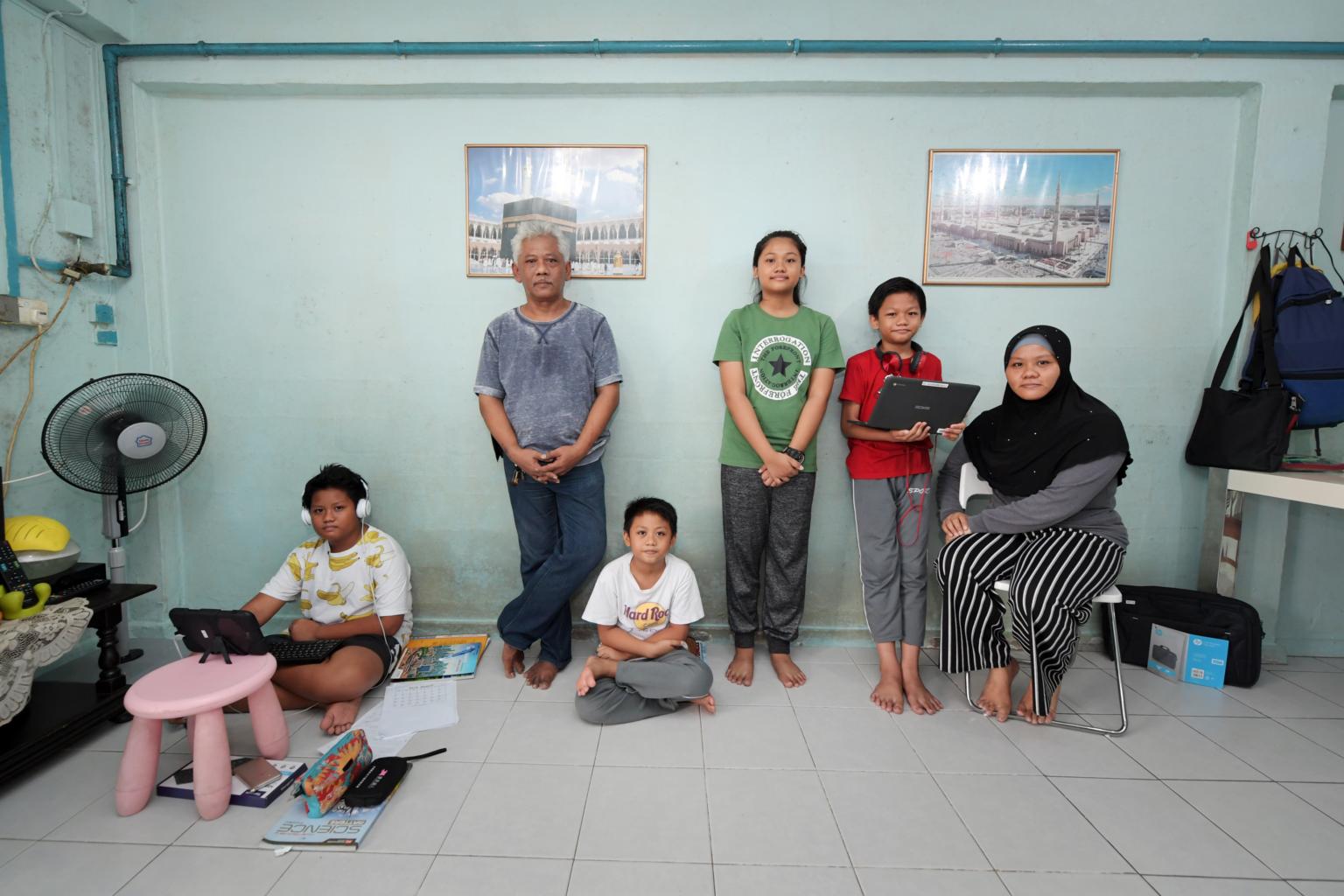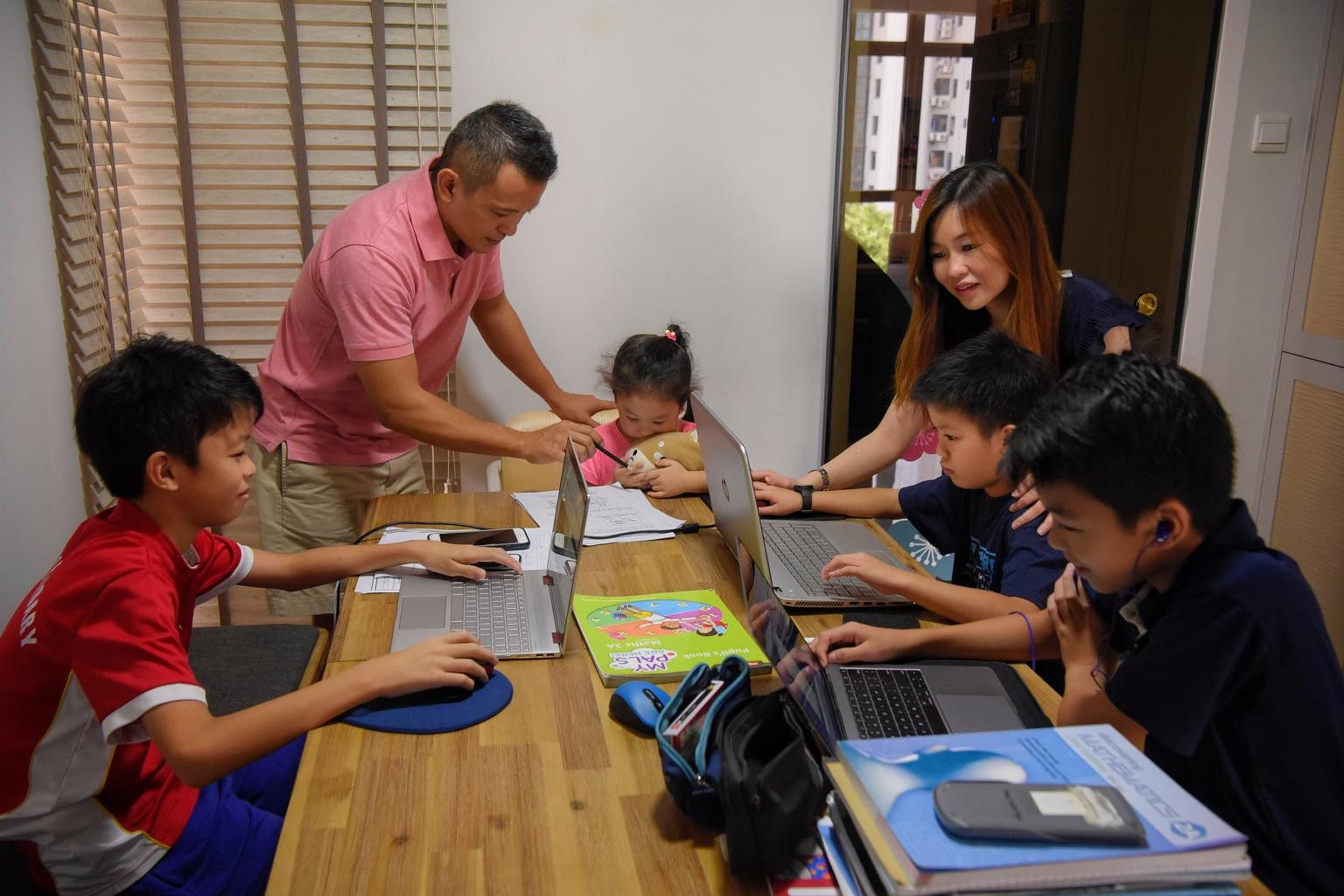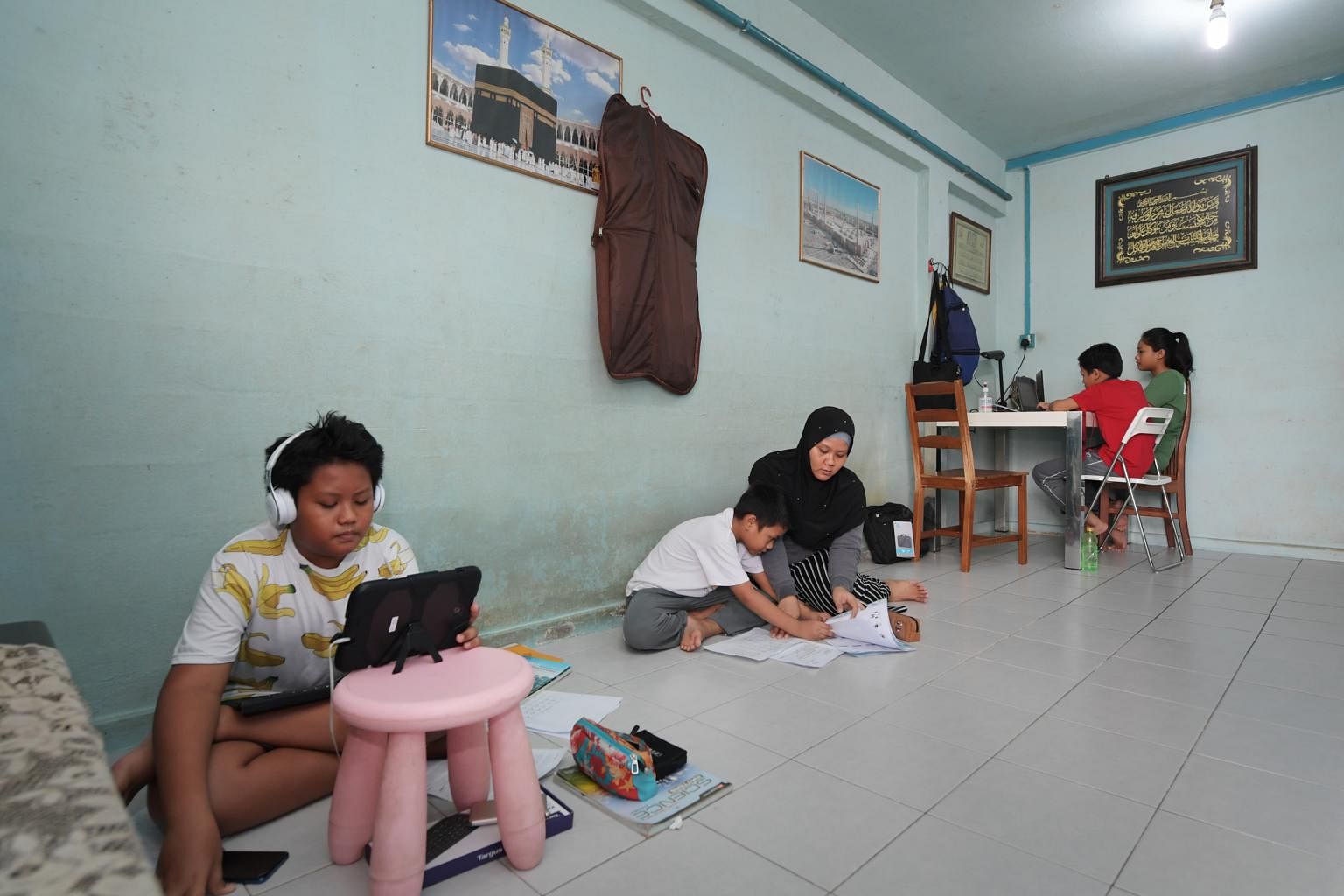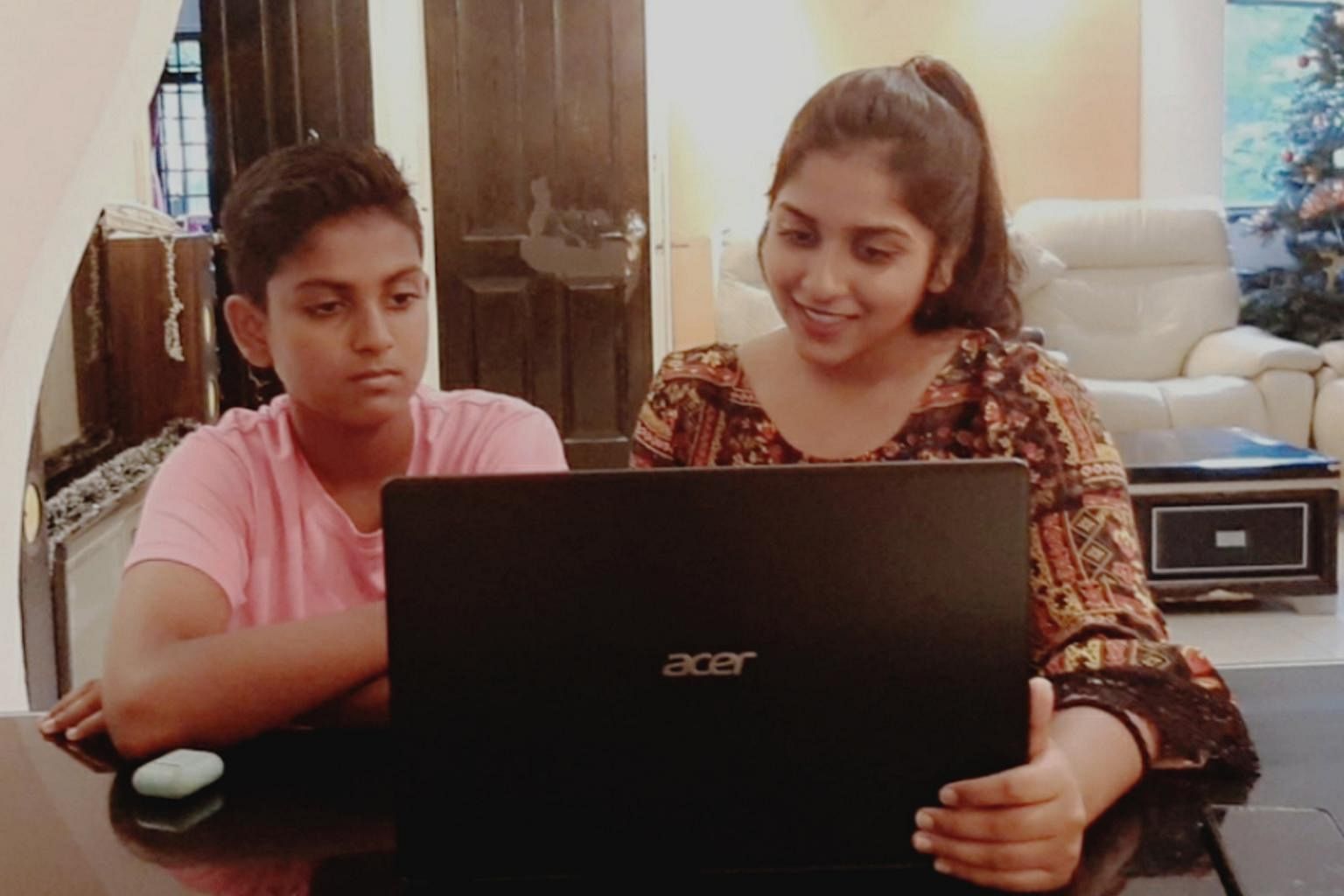How home-based learning shows up inequality in Singapore - a look at three homes
Sign up now: Get ST's newsletters delivered to your inbox

Mr Hashim Kamid (second from left), his wife Salmiah Salam (right) and their four children all live together in their flat in Lengkok Bahru.
ST PHOTO: ALPHONSUS CHERN
SINGAPORE - With schools closed and online learning in full swing, fault lines in the digital space have begun to emerge in the harsh light of the pandemic.
Since April 8, as part of circuit-breaker measures to curb the spread of Covid-19, students in Singapore have been engaged in full-time home-based learning (HBL), which requires the use of laptops or tablets.
The Government, schools, community groups and stores have seen a corresponding surge in demand for electronic devices.
According to figures provided by the Ministry of Education, about 12,500 laptops or tablets, as well as 1,200 Internet-enabling devices, such as dongles, have been loaned to students who do not have enough devices at home for HBL.
HBL, which applies for students in all schools and institutes of higher learning, comprises a mix of online and offline learning.
This typically includes e-learning via the Student Learning Space (SLS) platform and completing workbooks and worksheets. A small number of students, who are unable to stay home for HBL, are allowed to go to school.
However, observers say that the rich-poor gap highlighted by Covid-19 go beyond the digital divide.
They fear inequality in Singapore may worsen as the coronavirus continues its rampage across the global economy.
Besides the availability of devices, there are other factors that determine the extent to which children can reap the benefits of HBL.
These include the physical environment, parental skills and connectivity issues, says Professor Lim Sun Sun, who teaches communication and technology at Singapore University of Technology and Design (SUTD).
For example, a child who has his own room may find it easier to concentrate on HBL, while three children sharing one laptop in the living room may have more difficulty focusing on the assignments.
In addition, parents working from home "need to be on hand to help their children address technical glitches", says Prof Lim, a Nominated MP who heads SUTD's humanities, arts and social sciences department. E-learning requires negotiating passwords, working on different interfaces and uploading completed homework, for instance.
In addition, wealthier parents have the option of paying for online tuition, which could boost HBL for their children.
Dr Stephanie Chok, assistant director of research and programme development at Beyond Social Services, a charity that serves low-income households, notes that Covid-19 affects poor families disproportionately.
Volunteer-run free tuition sessions for needy families have ground to a halt under the circuit breaker.
Dr Chok says: "Inequalities will likely widen since work in low-paid sectors, such as the service sector, has been badly affected.
"There is increased competition for such jobs, yet also heightened instability. Many of the people we support also tend to be part-time or casual workers, who are often the first to be dismissed, or asked to take no-pay leave."
Without intervention on a societal scale, the inequalities that have surfaced are likely to worsen, says sociologist Teo You Yenn, whose bestselling book, This Is What Inequality Looks Like (2018), helped propel inequality to the forefront of policy discussions.
Associate Professor Teo, head of Sociology at Nanyang Technological University (NTU), says: "Some of these fault lines are along socio-economic lines. The question of equipment and Internet access is perhaps the most easily resolved (as devices are being supplied by various groups). But beyond this, children have uneven access to space, to tech support, to help with schoolwork.
"The longer this goes on, the more the gap will widen because when the kids return to school, those who are already behind may have fallen even further behind.
"Moreover, the global economic impact of the crisis will likely have long-term consequences for inequalities across families.... We may see a rise in the number of youths who need to leave school and start work sooner to support their families. In contrast, youth whose family incomes allow, may decide to stay in school longer, rather than enter a poor job market."
In the long term, she says, this could widen educational attainment and income inequalities within the same age cohort.
The Straits Times examines how HBL has highlighted differences in the study environments in three families from different economic backgrounds. From families with enough resources to look into imparting other life skills during this period, to those struggling to optimise studying in a cramped flat, they are all doing the best they can.
Instilling life skills during home-based learning

With four children aged three to 13 at home, Ms Zoe Chu says her family was "on the verge of a volcanic eruption" on April 8 when full home-based learning (HBL) started in earnest.
"All this while they were going to school, so I could do my work from home in peace. Then I realised on day one (of full HBL) that I had to supervise," says the 40-year-old, who runs SG Supernanny, a baby and child sleep training consultancy, from the family's 1,200-sq-ft, three-bedroom condominium in Jurong East.
"I think that's the thing we all did not expect, you know - there's so much work."
Her husband, dentist Justin Stewart Saga, 43, was "still happily exercising" that morning, thinking that their children could handle HBL independently.
She says: "I was like, I don't think this is going to work. We need to supervise them a lot more than just leaving them to their own devices."
While her 13-year-old twins, Brayden and Dylan, managed their schoolwork independently, as they are in Secondary 2, she had to make sure they did not do too much gaming during breaks.
Eight-year-old Callum, who is in Primary 3, needed more supervision, as he is easily distracted, and three-year-old Alyssa had HBL worksheets from her pre-school to complete too.
"And they are constantly asking for snacks as well, in between. It's like, I just fed you," Ms Chu quips.
Since then, she has drawn up detailed schedules for the children. Callum's, for instance, includes an hour of exercise and "creativity time" and 60 minutes of educational activities online, as well as the promise of a reward of playing games he likes if he follows his schedule properly.
Still, she admits, mornings are spent "being a primary school teacher or kindergarten teacher", so she cannot start on her own work with clients until the afternoon.
The older children do their school work at the dining table. Brayden uses a Macbook, a requirement for his studies at the School of Science and Technology, Singapore; Dylan works on his father's HP laptop and Callum uses an old spare laptop.
Ms Chu helps the children with problems with English, while her husband handles mathematics.

"It's not easy to teach our kids," she bemoans.
When her husband gets frustrated because Callum still does not understand division, she waits until he calms down.
"Then we talk about what's the best way to approach this," she says. "It's all about communicating with each other. I know a lot of families are probably getting stressed, so I think it's probably best for married couples not to add to each other's stress by having arguments."
Ms Chu, who has a master's degree in commerce and management from Lincoln University in New Zealand, says she tells her children that "values are the most important thing; it's not about grades".
The children are expected to do some housework daily, even though they have a live-in helper. The three boys, who share a room, tidy their beds, empty the rubbish bin and do some vacuuming. Alyssa does her part by cleaning up after her activities.
In the same vein, Ms Chu also got her teenagers to use her online subscription to Mentorbox "to boost their mindset with learning how to be a better person". The subscription-based service provides, among other things, bite-size summaries by the authors of books on topics such as entrepreneurship and self-development.
"After they watch it, I want them to come back and report to me, and tell me what they have learnt, so that I can also learn from them," she says. Dylan, for example, shared tips he learnt about improving one's Instagram bio, which she promptly used.
The social media-savvy mum even used the music-based platform TikTok to teach her brood to get along better, while staying at home.
She asked them to take on the Blinding Lights challenge, which requires them to all dance in sync to the eponymous song by The Weeknd.
"It's not perfect, but at least they tried to work together, and I think I can keep getting them to do these themed challenges."
Working on devices on loan in a rental flat

A 14-year-old boy is sitting cross-legged on the floor, looking at his tablet loaned from school. A nine-year-old is sprawled on his belly, doing his homework on the floor.
Their other two siblings, a girl aged 12 and a boy aged 11, are seated at a small table against the wall in the two-room rental flat, doing their HBL.
The four children share three devices among them for HBL. The family have a laptop which they bought at a subsidised rate through a government scheme for low-income households. There is a laptop and a tablet, both on loan from school for HBL.
While the three devices are sufficient for the children's HBL needs, which include hard copy worksheets and online assignments, the family, who do not have a household Wi-Fi subscription, has problems with connectivity.
The children's mother, Madam Salmiah Salam, 37, uses a dongle, donated by a charity, to turn her smartphone into a Wi-Fi hot spot, but it is not working properly. The patchy Internet access means online work for HBL slows from time to time.
The housewife, who left school after her N levels, is finding HBL stressful.
She says: "I have to teach my children. If they don't understand the work, I have to explain it to them. But sometimes I myself don't understand the concept. I go to YouTube to find out more."
She has been refreshing her knowledge of factors and multiples alongside her youngest child, Muhammad Hadiputra Hashim, who is in Primary 4.
She says: "I wish my kids had a more conducive study environment. Then at least they can be more engaged learners. But we lack space, so we make do with what we have."
The family's sparsely furnished rental flat in Redhill comprises a hall, a kitchen and a bedroom. They usually have dinner together on the floor in the hall.
During this period when schools are closed and the afternoons stretch lazily, the children have been taking more naps than usual on pillows strewn on the floor.
Another source of stress for Madam Salmiah and her 56-year-old husband is that he is out of work.
Mr Hashim Kamid, the sole breadwinner, quit his job as a cleaner at a condominium at the end of February. He feared bringing the coronavirus into his home after a day of cleaning lifts and other surfaces.
A few years ago, after his operation for an infected stomach ulcer, his doctor had also advised the former rubbish collector to work in a more hygienic environment.
He was earning about $1,100 a month. Ms Salmiah has been taking her few pieces of jewellery to the pawnshop in the past month.
"We did this before. Hashim was retrenched when the children were younger," she says.
She was too "paiseh" (Hokkien for embarrassed) to ask for help. But Beyond Social Services, which has supported the family before, asked if she needed assistance during the Covid-19 outbreak.
The charity, which helps children and young people from less privileged backgrounds, has provided her with $150 for groceries and is processing more financial aid for the family.
The Solidarity Payment, a $600 cash payout for adult Singaporeans to cope with the pandemic, has also eased her burden, she says.
The couple hope normalcy will return soon and that Mr Hashim finds another job.
In the meantime, they try to find some light-heartedness in the situation.
Mr Hashim, who has been cooking more, is not used to being around his four children 24/7. He recently asked his wife how she could tahan (Malay for tolerate) being with the children all day long.
Glad for a free laptop under IMDA assistance scheme

Sheryl Shivani, 17, had been dreading the start of full-time HBL.
Worried about not being able to keep up with studying for her O levels this year, she remembers the disastrous unfolding of a recent e-assignment she did on her smartphone, a device that is not suited for HBL.
It was tedious opening multiple tabs on her mobile phone, which could not support all the features she needed for the lesson. She could not finish her history assignment in the end.
She resolved to save up for a laptop of her own by skipping lunch at school.
"I didn't want to share my feelings, as I was embarrassed and sad. I would spend my lunch-time chilling out with my friends and go home to eat," says Sheryl, who is in Secondary 5.
Neither did she want to ask her mother, a single parent, to buy the gadget for her.
"I know Mummy's situation and how hard she needs to work for us. I saved up a few years ago to buy my mobile phone. I'm good at saving money," she says.
Her mother, Ms Cynthia Jyanthi, who declined to give her age, is a nurse at a nursing home.
She communicated her anxiety about Sheryl's lack of a laptop to her teacher.
"I work long hours. While I may be able to sit with them for a while, I cannot follow through. I do ask them if they need any help and I've been interacting with their teachers," says Ms Cynthia, who also has two sons.
Her younger son, Secondary 1 student Gerald Giresh Raj, 13, is using a laptop on loan from his school for HBL, while her older son, 19, is waiting to enlist in national service.
Ms Cynthia's 68-year-old mother, who had a cardiac arrest in recent months and uses a wheelchair, also lives with her.
Luckily, help arrived when Sheryl's teacher notified her of the NEU PC Plus programme, which is administered by Infocomm Media Development Authority (IMDA).
It offers low-income households and persons with disabilities the opportunity to own a computer at a subsidised rate. Successful applicants get a desktop or laptop and three years' free broadband subscription.
Ms Koh Li-Na, assistant chief executive for IMDA's Digital Readiness Cluster, says: "Since circuit breaker measures were announced on April 3, we have seen an increase of more than fivefold in the number of inquiries."
She attributes the rocketing interest to expanded support for students under the Ministry of Education's (MOE) Financial Assistance Scheme.
Because Sheryl met the criteria for the MOE scheme, she received a free laptop last week.
HBL is a breeze for her now and she spends less time on her online work.
"With this new laptop, I've learnt a few things like how to use MS Word and how to submit assignments via Google Classroom. It's much faster," she gushes.
"I'm amazed that I have my own laptop to use. Finally, I can do something that my friends had been doing all this time."


